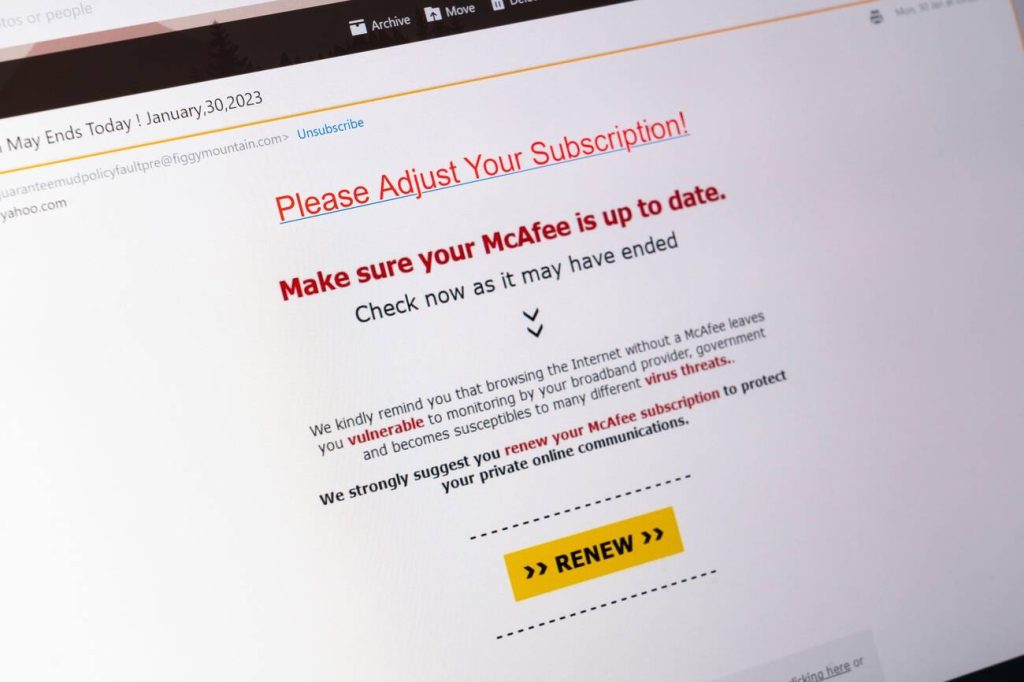Are you one of the many people who have received a pop-up notification claiming that your McAfee antivirus subscription has expired? You’re not alone. This scam has become increasingly widespread, targeting unsuspecting users who visit suspicious websites. These convincing notifications create a sense of urgency and pressure you to renew your subscription immediately. But beware! Clicking on these pop-ups can lead to unwanted charges or even malware infections. In this article, we’ll explore why scammers are using this tactic and provide essential tips to protect yourself from falling victim to this malicious scheme.
Signs of a Fake McAfee Subscription Expiration Message
If you’re wondering why McAfee is telling you that your subscription has expired, there are certain signs to look for that indicate it might be a fake message. To verify legitimate McAfee subscriptions, always go directly to the official McAfee website or contact their customer support. Scammers often gather personal information through phishing emails, fake websites, or by exploiting vulnerabilities in software. When it comes to fake McAfee pop-ups, there are red flags to watch out for such as spelling and grammar errors, suspicious URLs, and urgent language pushing you to click on renewal links. Clicking on these links can have severe consequences including unwanted charges, malware infections, and even theft of sensitive data. If you come across a scam site posing as McAfee, report it immediately to protect yourself and others from falling victim to this scam.
Common Tactics Used by Scammers to Trick McAfee Users
Scammers utilize various tactics to deceive McAfee users and trick them into falling victim to their schemes. Here are three common scam tactics used by scammers:
- Fake pop-ups: Scammers create fake pop-ups that resemble legitimate McAfee notifications. These pop-ups claim that your subscription has expired or that your computer is infected with malware, creating a sense of urgency.
- Social engineering: Scammers use psychological manipulation to exploit your fears and convince you to take immediate action. They may impersonate customer service representatives or use persuasive language to gain your trust.
- Spoofed websites: Scammers create fake websites that look like official McAfee sites. These websites prompt you to enter sensitive information or download malicious software, leading to financial loss or malware infections.
To protect yourself against scams, be vigilant for warning signs such as unsolicited pop-ups, suspicious emails, or requests for personal information. Report scam sites directly to McAfee and always verify the legitimacy of any communication before taking action.
The Risks of Falling Victim to the Expired Subscription Scam
Beware of the potential consequences if you fall victim to the expired subscription scam, including financial loss and malware infections. The impact of this scam on McAfee’s reputation is significant. Scammers use psychological tactics to create urgency in their victims, making them believe that their subscription has expired and immediate action is required. Falling victim to this scam can have long-term consequences such as financial loss, malware infections, sensitive data theft, and even cryptocurrency mining using your computer’s resources. Education and awareness play a crucial role in preventing this scam. By being informed about these tactics and staying vigilant, you can protect yourself from becoming a victim. Legal actions are also being taken against scammers involved in the expired subscription scam to hold them accountable for their fraudulent activities.
Preventive Measures to Avoid Falling for the Scam
Take proactive measures to protect yourself from falling for the expired subscription scam, such as avoiding suspicious websites and downloading content from untrusted sources. Here are three preventive measures you can implement to safeguard your online security:
- Recognize phishing attempts: Be cautious of unsolicited emails, messages, or pop-ups asking for personal information or claiming urgent actions needed. Verify the legitimacy of any requests before providing sensitive data.
- Importance of regular software updates: Keep your operating system, web browsers, and antivirus software up to date. These updates often include security patches that help protect against known vulnerabilities.
- Practice secure browsing habits: Use strong, unique passwords for all accounts and enable two-factor authentication when available. Be mindful of the websites you visit and only download files from trusted sources.
Steps to Take if You’ve Been Deceived by the McAfee Subscription Expiration Scam
If you’ve fallen for the McAfee subscription expiration scam, here are the steps you can follow to address the situation. First, report scam site URLs to McAfee so they can take action against the scammers. Next, contact your bank or credit card company and request a refund for any unauthorized charges made by the scammers. It’s also important to monitor your bank statements closely for any suspicious transactions in case your financial information was compromised. To protect yourself further, update all of your passwords, especially those related to your online accounts and banking information. Lastly, install ad blockers on your web browser to prevent malicious pop-ups and ads from appearing in the future. By taking these steps, you can mitigate the damage caused by falling victim to this scam and safeguard yourself against future attempts.
How Scammers Profit From the Expired Subscription Scam
When falling victim to the expired subscription scam, scammers profit by earning commissions as affiliate marketers for McAfee. Here are three ways scammers profit from this scam and how you can protect yourself:
- Fake Subscription Messages: Scammers create convincing pop-ups that mimic legitimate McAfee notifications, tricking users into thinking their subscription has expired. They then prompt users to renew their subscription through affiliate links, earning commissions in the process.
- Scam Tactics: These scammers use various tactics like malvertising, browser hijacking, and hidden iframes to display fake subscription messages. They rely on creating a sense of urgency and pressuring users to act immediately.
- Risks of Falling Victim: If you fall for this scam, you may unknowingly click on buttons that redirect you to real McAfee sites through affiliate links, resulting in unwanted charges. You could also download fake antivirus tools that lead to malware infections or have your sensitive data stolen.
To protect yourself from this scam, avoid visiting suspicious sites and downloading content from untrusted sources. Keep your antivirus software up to date and use ad-blockers and browser extensions to block malicious pop-ups. If you encounter a fake subscription message, do not click on any buttons or links; instead, close the browser or tab immediately.
Essential Actions to Protect Yourself From Future Scams
To safeguard against future scams, remember to regularly update your antivirus software and operating system. Taking these steps is crucial in protecting yourself from potential threats. Be aware of warning signs such as suspicious pop-ups claiming that your subscription has expired or that malware has been detected on your device. These are common tactics used by scammers to trick unsuspecting users into falling for their scams. It’s important to take protective measures by avoiding visiting suspicious websites and downloading content from untrusted sources. Additionally, using ad-blockers and browser extensions can help block malicious pop-ups and scripts. By being proactive in self-protection and staying vigilant against future scams, you can minimize the risk of falling victim to these fraudulent activities.






